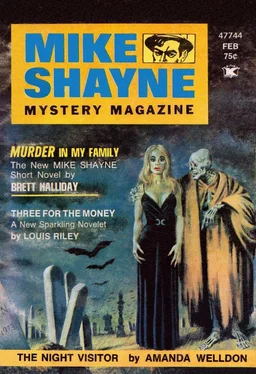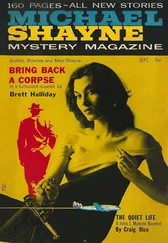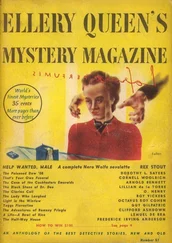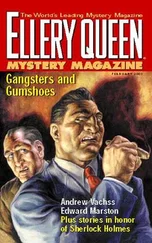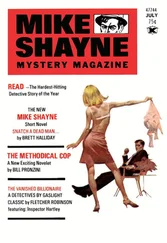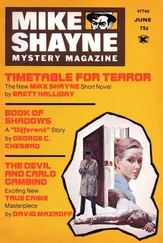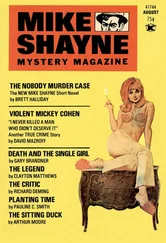Бретт Холлидей - Mike Shayne Mystery Magazine, Vol. 34, No. 3, February 1974
Здесь есть возможность читать онлайн «Бретт Холлидей - Mike Shayne Mystery Magazine, Vol. 34, No. 3, February 1974» весь текст электронной книги совершенно бесплатно (целиком полную версию без сокращений). В некоторых случаях можно слушать аудио, скачать через торрент в формате fb2 и присутствует краткое содержание. Город: Los Angeles, Год выпуска: 1974, Издательство: Renown Publications, Жанр: Детектив, на английском языке. Описание произведения, (предисловие) а так же отзывы посетителей доступны на портале библиотеки ЛибКат.
- Название:Mike Shayne Mystery Magazine, Vol. 34, No. 3, February 1974
- Автор:
- Издательство:Renown Publications
- Жанр:
- Год:1974
- Город:Los Angeles
- ISBN:нет данных
- Рейтинг книги:3 / 5. Голосов: 1
-
Избранное:Добавить в избранное
- Отзывы:
-
Ваша оценка:
- 60
- 1
- 2
- 3
- 4
- 5
Mike Shayne Mystery Magazine, Vol. 34, No. 3, February 1974: краткое содержание, описание и аннотация
Предлагаем к чтению аннотацию, описание, краткое содержание или предисловие (зависит от того, что написал сам автор книги «Mike Shayne Mystery Magazine, Vol. 34, No. 3, February 1974»). Если вы не нашли необходимую информацию о книге — напишите в комментариях, мы постараемся отыскать её.
Mike Shayne Mystery Magazine, Vol. 34, No. 3, February 1974 — читать онлайн бесплатно полную книгу (весь текст) целиком
Ниже представлен текст книги, разбитый по страницам. Система сохранения места последней прочитанной страницы, позволяет с удобством читать онлайн бесплатно книгу «Mike Shayne Mystery Magazine, Vol. 34, No. 3, February 1974», без необходимости каждый раз заново искать на чём Вы остановились. Поставьте закладку, и сможете в любой момент перейти на страницу, на которой закончили чтение.
Интервал:
Закладка:
“A fastback with a broken-out wing window. Probably done by some Forks fan right after the-game. It wasn’t hit and run, either. Somebody stayed long enough to heist my athletic grip from the back seat.”
“With your basketball shoes inside, I suppose.”
“I had to borrow a pair for a pick-up game at the field house that next afternoon, on Saturday. Stretch Ulrich’s Size 11½’s. I’ve still got the blisters.”
“No one saw you leave the parking lot in your own car?”
“No one but Julie. The lot was deserted. There were a few cars parked around. But no students in them, or around them. And if you want me to establish what time I got home, you’ll have to take my word for that, too. I’ve got a room in the basement of my folk’s home, rear entrance. Private. No one heard or saw me come in at that hour.”
“But they — your parents — might have heard your car as you pulled up into the driveway.”
“Dad’s car was parked in the driveway,” said Lonnie Davenport, with unblinking eyes. “And he leaves for work on Saturdays before I’m up. I parked out on Cypress Street.”
The boy fell silent.
Sheriff Strowe said nothing.
“What about fingerprints on Julie’s car?” asked Davenport. “The killer must have left some, or on the weapon.”
“The killer wore gloves. It was a cold night. And Julie’s killer took the murder weapon with him.”
“So where does that leave everybody?” Lonnie Davenport said.
“It leaves Julie Knight dead. And it leaves you as a paramount suspect.”
“I didn’t kill Julie Knight.”
“I’d like more than anything to believe you, Lonnie.”
“Sorry to drop you back where you started, Ev, but I don’t buy Lonnie Davenport as a killer.” Carl Dunlap, editor of The Zachary Herald-Talisman, had dropped by Strowe’s office on the pretext of a cup of coffee that was four hours old and strong enough to walk on its own two feet over to the Herald-Talisman if Dunlap really wanted some.
Strowe knew it wasn’t coffee Carl Dunlap wanted. What he wanted was a bit more serious in nature. What he desired was to go on record to Strowe with his own theory, for whatever it was worth. And a man of the intelligence and instincts of Carl Dunlap was a man whose theories demanded listening to seriously.
“You must have some strong feelings for thinking that way, Carl — or some strong reasons.”
“Just one,” Dunlap told Sheriff Strowe, pretending a sip of his coffee. “I attended the Zachary-Forks basketball game that night, Ev. You recall the near brawl at the end? When that Forks forward dropped Lonnie Davenport, and everyone became a participant?”
“What are you driving at, Carl?”
“Precisely this,” said Carl Dunlap. “In all that bedlam — the cops, the referees, the ballplayers, the students, the flailing fists, and the flying tackles... What was Lonnie Davenport doing? He was keeping cool and he was trying to separate the brawlers and he was trying to keep a bad situation from becoming a bloody free-for-all.
“And I ask myself, as you should seriously ask yourself, Ev, would a boy like that be capable of excessive jealousy, or rage, or hatred, or vindictiveness? Ev, I think you’ll get the same answer I’m getting. No, he wouldn’t be.”
“I have to agree with you, Carl. I suppose it’s better to have no suspects at all than the wrong one.”
“Well, cheer up, Ev. You may be receiving more assistance in this town than you know.”
“How do you mean, Carl?”
“Assistances from voices in the Zachary High Soundings.”
The Soundings had not been around in Ev Strowe’s day. It was the high school’s small literary magazine, a slender bimonthly publication put out by Zachary High’s English and Journalism students and advisored by Matt Hemphill, the head of the English Department. At 25¢ per copy, it was sold all over town, from the Bi-Rite Drugs to the book department of Chaney’s Department Store. It sold well. It also mildly surprised Strowe for its quality and adultness.
Carl Dunlap now presented Strowe with the current number of The Soundings. He had it folded open to a middle page, a red circle drawn around a four line poem on the lefthand side.
OVER YOUR SHOULDER
It sank like a boulder, didn’t it?
And while the girl died, a loon cried.
As your conscience watched you from behind,
Hidden in the darkened bush.
Hope Knight, ’75
Sheriff Strowe handed the volume back. “Julie Knight’s kid sister,” he said to Dunlap.
“Stalking a killer’s conscience and trying to smoke him out into the open,” said Dunlap. “She called me from the high school this morning.”
“Don’t tell me, let me guess. She wants you to print the poem in the Herald-Talisman. On the front page, in a black-bordered box.”
“Nothing so melodramatic. But she does want it printed on the editorial page in tomorrow evening’s edition.”
“What did you tell her?”
“That I’d think about it. I have a hunch there will be more poems, Ev. And if she knows something about her sister’s death, and her sister’s murderer...”
“...she’s setting herself up to be murdered as well,” Ev Strowe finished. “Which means I’d better drop out to the Knight place after school lets out and have a talk with Hope Knight.”
The Knight dairy farm was a family operation, though Strowe suspected Paul Knight at times wished he’d fathered two sons instead of two daughters. Two hired hands working three days a week helped to take up the slack, and the daughters and Paul’s wife, Betty, took up the rest.
Paul Knight had developed his 200 acres into one of the best dairy spreads in the valley. He had 165 prize Holsteins and his herd annually produced over 30,000 pounds of milk per animal, from a spotless milking parlor of thirty stalls and vacuum-operated milking machines.
Sheriff Strowe found Paul Knight in the milking parlor. He was between milkings, cleaning the aseptic tubes through which the milk ran from the parlor into stainless steel holding tanks at the end of the room. He had lost some weight and his blue eyes were ringed with sleeplessness and the continuing sadness of loss.
He smiled valiantly and gave Strowe a beefy hand. “Cleaning these things twice a day now. Been milking until eight in the evenings. I feel a little guilty about driving Betty and Hope and the part-time hands so hard. But then we’ve been hit with hard times.”
“I’d like to talk with Hope, Paul.”
“Up in her room changing. She got home from school about ten minutes ago.” He looked at Strowe significantly. “Your timing is too perfect not to want to see her for good reasons, Ev.”
Ev Strowe nodded and showed him the four-line poem in the Zachary High Soundings. Paul Knight read it carefully.
“Hope write this?”
“With a hinted promise to Carl Dunlap at the Herald-Talisman of more. She wants them published in the paper. I think she knows or suspects who killed Julie. And now she’s battering at the killer’s conscience through poetry.”
“She could make him tip his hand,” said Paul Knight.
“And she could follow her sister to an early grave,” Sheriff Strowe warned.
Paul Knight’s eyes reflected the same fearful possibility. “You better get on up to the house, Ev,” he said sternly.
If all of nature’s positive aspects of a young girl’s life had been bestowed upon Julie Knight, the imbalance reflected itself in her younger sister. There was no ignoring her excessive height, the big-bonedness, the eyes set too widely apart, which gave her face a sense of open space and a certain nonidentification.
Читать дальшеИнтервал:
Закладка:
Похожие книги на «Mike Shayne Mystery Magazine, Vol. 34, No. 3, February 1974»
Представляем Вашему вниманию похожие книги на «Mike Shayne Mystery Magazine, Vol. 34, No. 3, February 1974» списком для выбора. Мы отобрали схожую по названию и смыслу литературу в надежде предоставить читателям больше вариантов отыскать новые, интересные, ещё непрочитанные произведения.
Обсуждение, отзывы о книге «Mike Shayne Mystery Magazine, Vol. 34, No. 3, February 1974» и просто собственные мнения читателей. Оставьте ваши комментарии, напишите, что Вы думаете о произведении, его смысле или главных героях. Укажите что конкретно понравилось, а что нет, и почему Вы так считаете.
